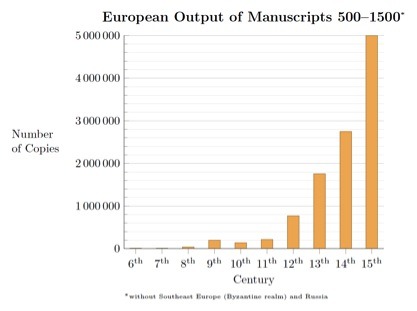Text
fun fact: basically every mod on r/legaladvice is a cop. if you see a bunch of comments in a row that have been deleted for “offering bad advice”, you can replace “reddit” in the url with “ceddit” to see the same page with all the deleted comments still there, and roughly half the time the “"bad advice”“ is literally anything that suggests that maybe OP shouldn’t trust the cops
130K notes
·
View notes
Text
There’s no such thing as the Dark Ages, but OK
As a very serious adult, with a respectable career and life, and a healthy ability to let petty shit slide, I spent much too much time last week arguing with strangers on the internet who believe in the myth of the Dark Ages.
The arguments in question focused on a massively inaccurate meme, which some observers of the group pointed out was originally supposed to be about knowledge loss after the burning of the Library of Alexandria, but which some very cool EDGE LORD had changed to be about ‘The Christian Dark Ages’. Please feast your eyes on it in all it’s massive wrongness:

This is, pretty obviously, a bunch of honkey bullshit and also massively incorrect, as many important scholars have noted. As a result, I spent hours of my life – which I will never get back - pointing out repeatedly that the ‘graph’ in question has nothing to do with reality, and arguing with non-experts about the medieval period.
For the most part – these people were well-meaning. Many pointed out that this was a very Euro-centric world view, and that Asia, Africa, and the Arab world were all making huge advancements in scientific and medical theory at this time. That is absolutely true. White people have never been the entire world. The Chinese had a massively advanced scientific culture by this time, for example, and had been holding it down with hermetically sealed research laboratories since the third century BCE. The Arab world, meanwhile was compiling treatises on eye surgery. Scientific advancement was something that was happening in this period. Europe is not the centre of the world.
Having said that, while it is important to acknowledge that the-rest-of-the-world was making huge strides in scientific advancement during this time, and that Europe and white people are not the entire world, nor responsible for all of human advancement, there was no such thing as the Dark Ages in Europe either.
While everything about the idea of the Dark Ages is incorrect, lets start off with the way the term was meant to be used. The totally ignorant graph above, unsurprisingly, is completely fucking off. Hilariously, the idea of the ‘Dark Ages’ actually originated in the medieval period itself. Petrarch – the poet laureate of fourteenth-century Rome - was actually the originator of the idea that there was a period of stagnation that Europe was moving out of. Petrarch had a political axe to grind. He considered that any point at which Rome – where he lived and worked and had considerable sway – did not completely dominate the world was a BAD TIME. This is not an unbiased assessment of world history.
The actual phrase ‘Dark Ages’ itself derives from the Latin saeculum obscurum, which Caesar Baronius – a cardinal and Church historian - came up with around 1602. He applied the term exclusively to the tenth and eleventh centuries. However, and very significantly in his use of the term, Baronius was not decrying a state of scientific malaise, or a particularly turbulent political period – he’s talking about a lack of sources surviving from that time. Indeed, Baronius sees the cut off point for the dark ages to be the Gregorian reforms of 1046, following which we see a massive increase in surviving documentation. Witness an actual useful chart:

When we move into a period where there are more texts to be considered, Baronius argues, Europe moved out of the period of darkness and into a ‘new age’.*
Now this is some real talk. As you can tell from that graph, during the Carolingian Renaissance of the ninth century, we see a flurry of Latin writers emerge, and a lot of text copying. This drops off again until what we term the Twelfth-Century Renaissance – home to this blog’s favourite philosopher/proto-Kanye – Abelard. (Shout out to my boy.) However, when people use the term ‘Dark Ages’ now, they usually use it to talk about the entire millennium of the Medieval period, and they aren’t talking about source survival. They aren’t thinking ‘dark’ as in ‘occluded’, they are thinking ‘dark’ as in pejorative.
We can thank the Enlightenment historiography for the expansion of the idea that the medieval period was a bad dark time. Kant and Voltaire in particular liked to see themselves as a part of an ‘Age of Reason’ as opposed to what they saw as the ‘Age of Faith’ of the medieval period. To their way of thinking, any time that the Church was in power was a time of regressive thinking. The Middle Ages, then, was a dark time because it was so dominated by religion.
The first push back against the term dark ages began with the Romantics. After the, um, unpleasantness of the Reign of Terror, and the major cultural and environmental upheavals of the Industrial Revolution it became fashionable to look at the medieval period as a time of spiritual focus, and environmental purity. Obviously this is a super-biased way of looking at the period – just like it was biased for Enlightenment thinkers to take one look at the primacy of the Church and declare an entire millennium to be bad. I mean, really what the Romantics were doing was just casting shade on the Enlightenment historiography because they felt like it inevitably led to the guillotine. But what can you do?
By the twentieth century historians had moved on from the idea pretty much completely. If you take the time to actually, you know, study the medieval period, it becomes very apparent very quickly that there was a tremendous amount of intensive thought happening. This is the era of Thomas Aquinas – a bad ass philosopher who will think you under the fucking table. Of Hildegard of Bingen – who basically founded scientific natural history in the German speaking lands. Hell, like we talked about last week Rogerius and Giles of Corbeil were throwing it down for major medical advancement. There was a lot going on. On the real, without the contributions of medieval thinkers you would not get Galileo, Newton, or the Scientific Revolution. The medieval period was not a period of stagnation, it was a time of progress.
But it’s not just that the idea of a ‘Dark Ages’ makes no sense when you look at what incredible advancement was happening at the time, it also makes no sense because it implies that stuff was going really well under the Romans. We estimate that somewhere between thirty to forty percent of the population of Italian Rome were slaves. The Romans had total bans on human dissection, meaning that there was no real way for medicine to progress any further than it had by the time of collapse – a problem that medieval people didn’t have. I mean even if you just want to make it about religion - the Roman Empire was Christian at the time of its collapse and had its heads of state worshipped as LITERAL GODS during the pagan era. Somehow every edgy motherfucker with a fedora is totally cool with this and thinks it is super reasonable though. Because ¯\_(ツ)_/¯. The Romans were not a bunch of really awesome people living a life of idealised rationality any more than medieval people were all ignorant savages living in fear of God.
Is there a time that historians use the term ‘Dark Ages’? Yeah, we do use it to talk about source survival rates. It’s not a term we use as a value judgment, however. We just mean that we don’t have a lot of evidence to go off of. By the same token – if we somehow move on to another electronic format without converting the way things are stored now, we could be moving into a theoretical Digital Dark Age, where historians in the future won’t be able to study what we are writing now. (And that would be a tragedy, because legit, I would kill to be a historian working on Donald Trump’s tweets in the year 2717.)
We’re now moving away from using the term Dark Ages at all, however, because of the frequency with which it is misinterpreted. I mean, if every basic motherfucker out there who never bothered to read God’s Philosophers (hat tip to James Hamman – this book is amazing) will insist on willfully misinterpreting us, we just ain’t gonna give them the ammo.
What it comes down to is that the medieval period was as vibrant as any other period of history. If you’re going to player hate, go ahead, but please don’t act like you know anything about either medieval or ancient history when you do. There is no period of rational supermen followed by ignorant monsters. There are just people doing their best in the circumstances.
* Caesar Baronius, Annales Ecclesiastici Vol. X. (Rome, 1602), p. 647. “Novum incohatur saeculum quod, sua asperitate ac boni sterilitate ferreum, malique exudantis deformitate plumbeum, atque inopia scriptorum, appellari consuevit obscurum.”
3K notes
·
View notes
Text
it does more harm than good to prop up the myth of the ‘neurotypical’ who completes tasks cheerfully with no issues. this person is a capitalist fantasy. the more you define yourself in comparison to this myth the more you justify social structures staying the same with minor accommodations to the ‘exceptions’ and the continued pathologizing of discomfort under hostile conditions
40K notes
·
View notes
Text
Lighting striking atop Acatenango volcano in Guatemala
Source
10K notes
·
View notes
Text
Of all the redemption arcs in popular fantasy media, I feel like Theoden's in The Lord of the Rings is the most overlooked.
The movies emphasize the magical control that the evil powers exercise over Theoden, but in the books, it's more obviously a depiction of bad kingship, in the British medieval sense. Theoden takes bad advice; he neglects his family; he fails to reward his knights; and he leaves his people vulnerable to attack. He also does not honor his kingdom's promises to help nearby kingdoms, as we can tell from Boromir's account of what Gondor has been going through.
Gandalf doesn't just cast out the curse and magically fix everything. He encourages Theoden to free himself from his bad advisor, but Theoden has to take all the subsequent steps. And those choices are not easy; after so much neglect, his knights are scattered, and his only option for defending his people is to gather them at Helm's Deep. The siege does not go well. His people are afraid and despairing. But nevertheless, he holds firm and charges out to meet the enemy -- and Gandalf literally meets him halfway, bringing with him the lost knights, whom Theoden welcomes and rewards after the battle.
Theoden could have just gone home after that. But when Gondor calls for aid, Theoden proves his worth by honoring his promises. He keeps his oaths not only to his people but to his allies.
And the climax of his redemption in the book is not his death, but his leadership. The ride of the Rohirrim against Sauron's armies is described in lavish detail, with an uncharacteristically heated pace: Theoden leads the entire line of Rohan, his banner streaming behind him in the wind as they race toward their foe. And that's the end of the chapter.
I love Theoden's arc so much, and especially that moment so much, because the message is not that he has to win battles or seek power. He just has to keep fighting. Theoden's greatest enemy isn't really Sauron: it's despair. And over the course of the book, he keeps choosing hope and action over despair and hesitation, until finally he can lead his people with courage.
As someone who struggles a lot with despair, I really needed to hear that story.
25K notes
·
View notes
Text
We are afraid of religion because it interprets rather than just observes. Religion does not confirm that there are hungry people in the world; it interprets the hungry to be our brethren whom we have allowed to starve.
- Dorothee Soelle, The Inward Road and the Way Back
2K notes
·
View notes
Text
i was gonna write it acutally but thought about writing the first sentence and the tiredlseepy got me so here's the concept
a conversation between cinderella and the prince after they're married. when she discovers he does not love her. he saw and recognised she needed rescuing, then played up the false 'love' angle to get the king to agree to it. cinderella does not love the prince either. but it would be an interesting convo. ending with them understanding one another rather more tyhan before. yearning for that which cannot be. &c. does anyone want to read it or
2K notes
·
View notes
Text
sorry for not answering messages for three thousand years i have. Stew. in place of a brain. you know how it is
75K notes
·
View notes
Text
the other day one of my coworkers halfway referenced the spiders georg post but stopped before he actually reached the spiders georg part. like. I can't be sure that that's what he was doing but one coworker said "yknow. people swallow several spiders every year" and my other coworker said "well that's just- it's not true. it's a- no, you'd wake up" and just. there was a look in his eyes. I just know
99K notes
·
View notes
Text
me: why are the pillows always so fucked up
my cat:

142K notes
·
View notes







